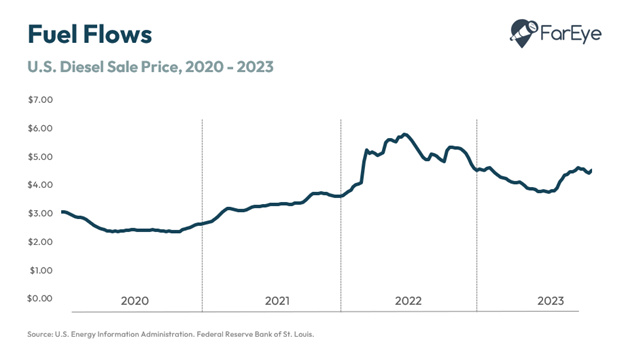- Logistics
- Platform
9 Best Logistics Management Software of 2025
The growing integration of technology in business operations, particularly in logistics and supply chains has brought significant advantages and positive impacts. Logistics management software has emerged as a cornerstone for operational efficiency and enhanced customer experiences. By leveraging automation and data-driven decision making, this digital transformation is revolutionizing the industry.
As customer demands continue to rise, the need for fast and efficient service delivery has become a pressing challenge. Logistics management software has redefined the way businesses handle items, freight, inventory, production, and overall distribution.
Today, businesses are experiencing remarkable improvements across operations from warehouse management to last mile delivery, leading to enhanced productivity and satisfied customers eager to share positive feedback. This article explores the esse
What Is a Logistics Management System and How Does It Work?
A logistics management system (LMS) involves the planning, implementing, and controlling supply chains to efficiently manage the storage, transportation, inventory, and production of goods from the source to the customer.
Advanced logistics software simplifies logistics management, enabling automation for tasks such as warehouse selection, storage optimization, and timely deliveries. The system focuses on fulfilling customer needs within specified timelines and serves consumers, retailers, and manufacturers alike.
With logistics software, goods and services can be efficiently managed in both forward and reverse logistics. Forward logistics ensures smooth operations for sorting, selection, order booking, and delivery, ensuring that items reach customers quickly and in good condition. On the other hand, reverse logistics handles customer returns, allowing rejected or damaged goods to be easily returned and reprocessed using the same system.
LMS enables businesses to manage their supply chain operations either independently or through third-party logistics providers (3PL). Third-party logistics companies specialize in managing and optimizing logistics operations, offering services that help businesses outsource these tasks efficiently.
By leveraging logistics management software, businesses can automate processes, improve efficiency, and ensure seamless transportation and storage, ultimately enhancing customer satisfaction.
10 Essential Features of Logistics Management Software
Efficient LMS is key to streamlining operations and ensuring timely deliveries. Here are ten essential features every LMS solution should offer:
1. Freight Dispatch Management
Efficient logistics management software must include pre-planned freight movement arrangements to ensure seamless delivery operations. This feature facilitates smooth transportation from the loading point to the delivery destination.
2. Freight Visibility Management
An LMS should offer robust freight visibility powered by accurate data. This feature optimizes shipment conveyance and route mapping, enhancing cost efficiency and saving time from the loading stage to final dispatch.
3. Real-Time Shipment Tracking
Logistics software should enable real-time tracking of goods, providing timely updates to shippers and customers. Automated notifications of transit conditions, supported by GPS, help address delays, mechanical issues, or other unforeseen disruptions effectively.
4. Fuel Management
Effective fuel management is a critical feature of logistics software. It enables access to fueling sites, tracks fuel consumption, and secures transactions. Additionally, it supports fuel inventory monitoring, preferred site controls, and comprehensive reporting for optimized resource utilization.

5. Engine Optimization
LMS should include efficient engine optimization to streamline delivery processes. This feature identifies optimal routes, monitors vehicle load arrangements, manages overdue contracts, and selects carriers based on shipment requirements and costs. It should also adapt route plans dynamically to overcome restrictions during transit.
6. Carrier Contract Management
The software should consolidate carrier contracts into a centralized database, facilitating better contract negotiation and alignment with business goals. This feature is crucial for leveraging advanced Transportation Management System (TMS) tools.
7. Warehouse Integration
Seamless integration with warehouse management systems (WMS) is a valuable feature. It enables real-time inventory updates, simplifies picking and packing operations, and ensures efficient coordination between storage and delivery. This integration minimizes delays and enhances overall supply chain efficiency.
8. Digital Billing and Payments
Automating billing and payments eliminates manual inefficiencies and reduces errors. With features like electronic invoicing and real-time payment tracking, this system prevents fraud, enhances financial accuracy, and accelerates payment processes. It also enables prompt invoice generation to adjust shipping rates and maintain financial transparency.

9. Reporting and Data Management
A robust reporting system is vital for data-driven decision making in logistics. Features such as visual dashboards, graphs, and maps help visualize transportation trends, disseminate critical insights, and support strategic planning in a timely manner.
10. Security Management
Robust security protocols are essential for protecting customer and organizational data. The LMS should include measures to prevent data breaches, unauthorized changes, and unapproved user access. Backup systems and invitation-based external access further enhance privacy and data integrity.
Benefits of a Logistics Management System
Logistics management software offers transformative solutions for the logistics industry by leveraging automation and optimization to enhance service delivery. Here are some key benefits:
Efficient Transportation Management:
Logistics software acts as a centralized control system for transportation operations. It enables businesses to manage resources effectively, leveraging GPS and mobile apps for real-time updates. These tools provide accurate driver locations and directions, ensuring end-to-end visibility across logistics operations. Moreover, the system helps reduce manual errors and ensures seamless coordination between dispatchers, drivers, and other stakeholders, improving overall transportation efficiency.
Automated Route Planning:
The software automates route planning for multiple deliveries, helping drivers optimize routes in real time. This improves operational efficiency, enhances transparency for customers, and reduces delivery times. Additionally, automated route planning minimizes fuel consumption, reduces operational costs, and ensures timely deliveries, making the supply chain more sustainable and profitable.
Route Optimization and Real-Time Updates:
By utilizing advanced algorithms, logistics software optimizes delivery routes and updates them in real time. This ensures proactive supply chain management and enables a self-service delivery model that improves overall logistics performance. Real-time updates also help businesses adapt to unexpected challenges like traffic or weather conditions, ensuring minimal delays and maintaining high customer satisfaction.
Driver Behavior Monitoring and Safety:
With robust driver monitoring features, the LMS helps track driver behavior, mitigate transportation risks, and ensure safety. These capabilities enhance operational efficiency and deliver exceptional customer service. In addition to improving safety, insights from driver behavior analysis can be used for targeted training programs, further enhancing driver performance and reducing accident risks.
Business Intelligence and Analytics:
Advanced business intelligence tools in logistics software enable proactive supply chain management. Automated task allocation and efficient workflows create a seamless delivery experience, encouraging positive customer feedback. These tools provide actionable insights through data analytics, helping businesses identify inefficiencies, predict trends, and make data-driven decisions to optimize overall performance.
Scalability and Flexibility:
A robust logistics management system adapts to business growth, simplifying deliveries and increasing profitability across the supply chain. It ensures that businesses can handle higher volumes without compromising efficiency or customer satisfaction, offering the flexibility to adjust to market demands and operational changes.
Enhanced Customer Satisfaction:
By reducing delivery turnaround times and automating task allocation, the system improves service quality. Customers benefit from a transparent and self-service delivery experience, fostering trust and earning positive reviews. Real-time tracking, proactive communication, and accurate delivery estimates ensure that customers remain informed and engaged throughout the delivery process, enhancing their overall experience.
9 Best Logistics Management Software of 2025
1. FarEye
FarEye is a leading logistics management platform that is revolutionizing delivery operations with its comprehensive suite of features. It excels in real-time tracking, allowing businesses to monitor shipments and vehicles throughout the delivery process, which is essential for ensuring timely execution and enhancing customer satisfaction. The platform employs intelligent routing algorithms that optimize delivery paths based on current traffic and weather conditions, effectively reducing delays and operational costs. Additionally, FarEye facilitates dynamic workforce management, enabling flexible task allocation based on real-time data to improve productivity. Its user-friendly interface and low-code/no-code setup simplify the onboarding process for carriers, making it adaptable for businesses of all sizes. FarEye also emphasizes sustainability by providing tools to track greenhouse gas emissions and optimize routes, helping businesses meet their environmental goals while improving overall efficiency in logistics operations.
2. SAP Supply Chain Logistics
SAP Supply Chain Logistics is a comprehensive suite designed to streamline and optimize supply chain processes across various industries. The platform integrates key functions such as demand planning, inventory management, and logistics execution, providing businesses with real-time visibility and control over their supply chains. By leveraging advanced analytics and machine learning, SAP enables accurate forecasting and efficient resource allocation, ensuring that products are available when needed. The system promotes collaboration among stakeholders through centralized data sharing, enhancing communication between suppliers, manufacturers, and distributors. Additionally, SAP Supply Chain Logistics supports automation of repetitive tasks, freeing teams to focus on strategic initiatives. With its flexible deployment options such as cloud or on-premises, SAP adapts to the evolving needs of businesses, making it a vital tool for achieving operational excellence in today’s complex supply chain landscape.
3. NetSuite Logistic Solutions:
NetSuite Logistic Solutions is a comprehensive cloud-based ERP system tailored for the transportation and logistics industry. It integrates various functionalities, including order management, inventory tracking, and supply chain management, providing businesses with a unified platform to streamline operations. Key features include real-time visibility into shipments and inventory levels, which enhances decision-making and operational efficiency. The software automates manual processes, reducing errors and improving accuracy in order fulfillment and delivery. Additionally, NetSuite offers advanced reporting tools that enable businesses to analyze performance metrics and forecast demand effectively. Its scalability allows businesses to adapt to changing market conditions while maintaining compliance with local regulations, making it an ideal solution for logistics companies looking to optimize their operations and enhance customer satisfaction.
4. BluJay Logistics Software
It is a leading cloud-based transportation management system (TMS) designed to enhance freight shipping efficiency for businesses of all sizes. It offers comprehensive features that cover the entire transportation process, including carrier selection, rate negotiation, shipment tracking, and delivery confirmation. The platform’s real-time visibility enables logistics managers to monitor shipments closely, improving responsiveness to potential disruptions. BluJay also facilitates collaboration through its Global Trade Network, connecting users with over 40,000 partners to optimize shipping operations and reduce costs. Its user-friendly interface and extensive reporting tools allow businesses to analyze performance metrics and streamline workflows effectively. With customizable options tailored to specific industry needs, BluJay is ideal for organizations looking to improve their logistics capabilities while ensuring scalability as they grow.
5. Oracle Transportation Management:
Oracle Transportation Management (OTM) is a robust cloud-based solution to streamline and optimize transportation operations across global supply chains. It provides a unified platform for managing all transportation activities, including order management, shipment planning, and freight auditing. OTM's advanced features include real-time visibility into shipments, allowing businesses to monitor progress and respond proactively to any disruptions. The system's optimization engine enhances decision making by identifying the most cost-effective carriers and routes while considering various constraints. Additionally, OTM supports multi-modal transport options and integrates seamlessly with other enterprise systems, ensuring a cohesive approach to logistics management. By automating processes and providing in-depth analytics, it helps businesses reduce costs, improve service levels, and enhance overall supply chain efficiency.
6. Quixy's Custom Logistics Software
It is a versatile, cloud-based platform designed to empower businesses to create tailored logistics applications without the need for extensive coding knowledge. Utilizing a user-friendly drag-and-drop interface, Quixy allows users to build and manage enterprise-grade applications quickly, enhancing operational efficiency and productivity. The platform offers customizable workflows, advanced data management capabilities, and seamless integration with existing systems, enabling businesses to streamline their logistics processes effectively. Additionally, Quixy provides pre-built templates for various logistics functions, such as inventory management and order processing, which can be easily modified to fit specific needs. With features like mobile access and real-time notifications, Quixy ensures that teams stay connected and informed, driving better collaboration and faster decision-making across the organization. Its flexibility and scalability make it an ideal choice for businesses looking to optimize their logistics operations in a rapidly changing environment.
7. Kuebix TMS
Kuebix TMS is a cloud-based transportation management system designed to enhance logistics efficiency for businesses of all sizes. It supports various transportation modes, including LTL, truckload, parcel, and intermodal shipping. Kuebix offers features such as real-time shipment tracking, carrier management, and freight auditing, which help businesses optimize their supply chain operations. The platform's predictive analytics capabilities provide actionable insights, enabling users to make informed decisions about carrier selection and route planning. With a user-friendly interface and rapid implementation process, Kuebix is recognized for its scalability and adaptability to diverse business needs. Additionally, it offers a free model, allowing businesses to access essential features at no cost while providing options for advanced functionalities through its Business Pro and Enterprise tiers. This flexibility makes Kuebix an attractive choice for businesses looking to improve their logistics management without significant upfront investment.
8. Trimble's Fleet Mobility Logistics Software:
It is a comprehensive solution designed to enhance fleet management and logistics operations. This platform integrates advanced telematics, real-time tracking, and route optimization to improve efficiency and reduce operational costs. By providing visibility into vehicle performance and driver behavior, Trimble enables businesses to make informed decisions that enhance productivity and safety. The software supports seamless communication between drivers and dispatchers, facilitating better coordination throughout the supply chain. Additionally, Trimble's solutions are built to adapt as businesses grow, ensuring that users can scale their operations without sacrificing performance. With robust analytics tools, the platform empowers businesses to analyze data trends, optimize routes, and improve service delivery. Overall, Trimble's Fleet Mobility Logistics Software is a vital tool for businesses seeking to streamline their logistics processes while maximizing resource utilization and enhancing customer satisfaction.
9. Optym Logistics Software:
Optym Logistics Software is a cutting-edge platform designed to optimize various aspects of transportation and logistics management. It leverages advanced analytics and artificial intelligence to enhance operational efficiency, focusing on critical areas such as capacity management, resource allocation, and route optimization. Optym's solutions cater to complex logistics challenges, providing businesses with tools to minimize costs and improve overall performance. The software supports real-time data analysis, enabling businesses to make informed decisions that adapt to changing market conditions. Additionally, Optym offers tailored solutions for different sectors including trucking and rail ensuring that the users can address their unique logistical needs effectively. By streamlining processes and enhancing visibility across the supply chain, Optym Logistics Software empowers businesses to achieve greater efficiency and customer satisfaction while maintaining a competitive edge in the industry.
Conclusion
The integration of logistics management software is transforming the logistics and supply chain industry by enhancing operational efficiency and customer satisfaction. As businesses face increasing demands for rapid and reliable service, these software solutions are critical in streamlining processes such as inventory management, transportation planning, and real-time tracking. The benefits of logistics management systems are manifold, including improved route optimization, automated task allocation, and enhanced visibility across operations, which contribute towards reduced costs and increased productivity. Ultimately, the adoption of advanced logistics software not only meets the evolving needs of customers but also positions businesses for sustainable growth in a competitive landscape.
Frequently Asked Questions
1. Which software is best for logistics?
Some of the top logistics software options include FarEye, Descartes, Oracle, and NetSuite Logistic Solutions, each offering unique features such as transportation management, real-time tracking, and route optimization tailored for various business sizes.
2. What are the 7 functions of logistics management?
Logistics management involves seven key functions that ensure the efficient movement of goods: transportation (selecting transport modes), warehousing (storing inventory), and inventory management (maintaining optimal stock levels). Additionally, order fulfillment ensures timely delivery of customer orders, while supply chain management integrates activities with suppliers and customers. Demand planning forecasts customer needs to align inventory, and logistics information systems provide data for informed decision-making. Together, these functions create an effective logistics strategy that enhances operational efficiency and customer satisfaction.
3. How can logistics optimization software improve operational efficiency?
Logistics optimization software enhances operational efficiency by automating scheduling, optimizing routes, reducing costs, and providing real-time visibility into supply chain processes, which collectively streamline operations and improve service delivery.
4. How does logistics scheduling software facilitate efficient management?
Logistics scheduling software aids efficient management by automating job scheduling, ensuring timely deliveries, optimizing resource allocation, and providing real-time updates on shipment statuses, which helps in minimizing delays and improving overall productivity.

Komal Puri is a seasoned professional in the logistics and supply chain industry. As the AVP of Marketing and a subject matter expert at FarEye, she has been instrumental in shaping the industry narrative for the past decade. Her expertise and insights have earned her numerous awards and recognition. Komal’s writings reflect her deep understanding of the industry, offering valuable insights and thought leadership.
Let's Talk to Our Experts and Optimize Your Deliveries Today!
An expert from our team will reach out within 24 hours
Related resources



